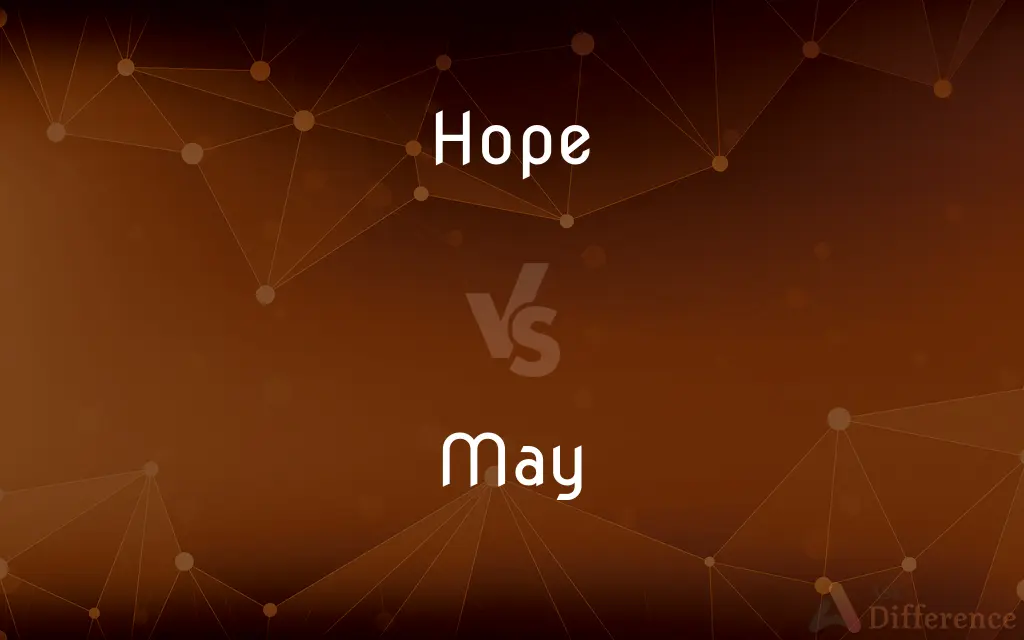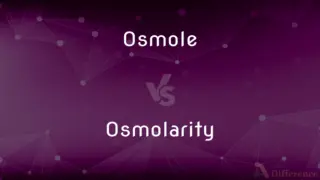Hope vs. May — What's the Difference?
By Tayyaba Rehman — Updated on January 7, 2024
Hope is a feeling of expectation and desire for a certain thing to happen, while May is a modal verb used to express possibility or permission.

Difference Between Hope and May
Table of Contents
ADVERTISEMENT
Key Differences
Hope denotes a desire or wish for something to occur in the future, often carrying emotional significance. It reflects optimism or a positive outlook. In contrast, May is used in grammar to indicate a possibility, likelihood, or potential for an action to occur, without an emotional connotation.
Hope is used to express personal aspirations, dreams, or wishes. It's subjective and reflects the individual's feelings or desires. May, however, serves a more objective grammatical function, indicating that something is allowed or might happen, often used in formal or polite requests.
In literature, hope is often used to build narrative tension, reflecting characters' desires and aspirations. May, on the other hand, is used to create ambiguity or uncertainty about future actions or events, adding a layer of unpredictability in storytelling.
Hope can be a noun or a verb, versatile in expressing longing or expectation. As a noun, it represents the concept of optimism, while as a verb, it conveys the act of desiring. May, as a modal verb, is used with another verb, showing permission or possibility, without changing its form for tense, person, or number.
In everyday communication, hope is used to express personal desires and expectations, often in a supportive or empathetic context. May is more formal, used in granting permission, making polite requests, or discussing potential future scenarios.
ADVERTISEMENT
Comparison Chart
Grammatical Category
Noun or verb
Modal verb
Function
Expresses desire or expectation
Indicates possibility or permission
Emotional Connotation
Yes, often carries emotional weight
No, more neutral
Usage in Literature
Builds narrative tension
Adds uncertainty or politeness
Common Usage
In personal, emotional contexts
In formal or uncertain scenarios
Compare with Definitions
Hope
Desire for a specific outcome.
I hope to visit Paris next summer.
May
Express permission.
You may leave the room now.
Hope
Expectation of something positive.
We hope for good weather on the weekend.
May
Indicate purpose.
I exercise so that I may stay healthy.
Hope
To look forward to with desire and reasonable confidence.
I hope to become a doctor someday.
May
Indicate possibility.
It may rain this afternoon.
Hope
A feeling of trust.
She holds onto the hope that things will improve.
May
Express a wish or hope (formal).
May you have a prosperous New Year.
Hope
A person or thing that may help in saving.
He is our last hope in solving the problem.
May
May is the fifth month of the year in the Julian and Gregorian calendars and the third of seven months to have a length of 31 days. May is a month of spring in the Northern Hemisphere and autumn in the Southern Hemisphere.
Hope
Hope is an optimistic state of mind that is based on an expectation of positive outcomes with respect to events and circumstances in one's life or the world at large. As a verb, its definitions include: "expect with confidence" and "to cherish a desire with anticipation."Among its opposites are dejection, hopelessness, and despair.
May
The fifth month of the year, in the northern hemisphere usually considered the last month of spring
The full system was deployed last May
The new model makes its showroom debut in May
Hope
To wish for a particular event that one considers possible
We are hoping for more financial support.
May
Used in polite requests or offers.
May I help you with your luggage?
Hope
(Archaic) To have confidence; trust.
May
Expressing possibility
That may be true
He may well win
Hope
To desire and consider possible
I hope that you will join us for dinner. We hope to buy a house in the spring.
May
Used to ask for or to give permission
May I ask a few questions?
You may confirm my identity with your Case Officer, if you wish
Hope
The longing or desire for something accompanied by the belief in the possibility of its occurrence
He took singing lessons in the hope of performing in the musical.
May
Expressing a wish or hope
May she rest in peace
Hope
An instance of such longing or desire
Her hopes of becoming a doctor have not changed.
May
A hawthorn or its blossoms.
Hope
A source of or reason for such longing or desire
Good pitching is the team's only hope for victory.
May
The fifth month of the year in the Gregorian calendar. See Table at calendar.
Hope
Often Hope(Christianity) The theological virtue defined as the desire and search for a future good, difficult but not impossible to attain with God's help.
May
The springtime of life; youth.
Hope
(Archaic) Trust; confidence.
May
The celebration of May Day.
Hope
To want something to happen, with a sense of expectation that it might.
I hope everyone enjoyed the meal.
I am still hoping that all will turn out well.
May
To be strong; to have power (over).
Hope
To be optimistic; be full of hope; have hopes.
May
To be able; can.
Hope
(intransitive) To place confidence; to trust with confident expectation of good; usually followed by in.
May
To be able to go.
Hope
To wish.
May
To have permission to, be allowed. Used in granting permission and in questions to make polite requests.
You may smoke outside;
May I sit there?
Hope
The feeling of trust, confidence, belief or expectation that something wished for can or will happen.
I still have some hope that I can get to work on time.
After losing my job, there's no hope of being able to afford my world cruise.
There is still hope that we can find our missing cat.
May
Expressing a present possibility; possibly.
He may be lying;
Schrödinger's cat may or may not be in the box
Hope
(countable) The actual thing wished for.
May
Expressing a wish (with present subjunctive effect).
May you win;
May the weather be sunny
Hope
(countable) A person or thing that is a source of hope.
We still have one hope left: my roommate might see the note I left on the table.
May
Used in modesty, courtesy, or concession, or to soften a question or remark.
Hope
The virtuous desire for future good.
May
To gather may, or flowers in general.
Hope
A hollow; a valley, especially the upper end of a narrow mountain valley when it is nearly encircled by smooth, green slopes; a combe.
May
To celebrate May Day.
Hope
A sloping plain between mountain ridges.
May
The hawthorn bush or its blossoms.
Hope
(Scotland) A small bay; an inlet; a haven.
May
(archaic) A maiden.
Hope
A sloping plain between mountain ridges.
May
An auxiliary verb qualifying the meaning of another verb,
How may a man, said he, with idle speech,Be won to spoil the castle of his health!
For what he [the king] may do is of two kinds; what he may do as just, and what he may do as possible.
For of all sad words of tongue or penThe saddest are these: "It might have been."
Hope
A small bay; an inlet; a haven.
May
Liberty; permission; allowance.
Thou mayst be no longer steward.
Hope
A desire of some good, accompanied with an expectation of obtaining it, or a belief that it is obtainable; an expectation of something which is thought to be desirable; confidence; pleasing expectancy.
The hypocrite's hope shall perish.
He wished, but not with hope.
New thoughts of God, new hopes of Heaven.
May
Contingency or liability; possibility or probability.
Though what he learns he speaks, and may advanceSome general maxims, or be right by chance.
Hope
One who, or that which, gives hope, furnishes ground of expectation, or promises desired good.
The Lord will be the hope of his people.
A young gentleman of great hopes, whose love of learning was highly commendable.
May
Modesty, courtesy, or concession, or a desire to soften a question or remark.
How old may Phillis be, you ask.
Hope
That which is hoped for; an object of hope.
Lavina is thine elder brother's hope.
May
Desire or wish, as in prayer, imprecation, benediction, and the like.
Hope
To entertain or indulge hope; to cherish a desire of good, or of something welcome, with expectation of obtaining it or belief that it is obtainable; to expect; - usually followed by for.
But I will hope continually.
May
A maiden.
Hope
To place confidence; to trust with confident expectation of good; - usually followed by in.
Why art thou cast down, O my soul? and why art thou disquieted within me? Hope thou in God.
May
The fifth month of the year, containing thirty-one days.
Hope
To desire with expectation or with belief in the possibility or prospect of obtaining; to look forward to as a thing desirable, with the expectation of obtaining it; to cherish hopes of.
We hope no other from your majesty.
[Charity] hopeth all things.
May
The early part or springtime of life.
His May of youth, and bloom of lustihood.
Hope
To expect; to fear.
May
The flowers of the hawthorn; - so called from their time of blossoming; also, the hawthorn.
The palm and may make country houses gay.
Plumes that mocked the may.
Hope
A specific instance of feeling hopeful;
It revived their hope of winning the pennant
May
The merrymaking of May Day.
Hope
The general feeling that some desire will be fulfilled;
In spite of his troubles he never gave up hope
May
The month following April and preceding June
Hope
Grounds for feeling hopeful about the future;
There is little or no promise that he will recover
May
Thorny Eurasian shrub of small tree having dense clusters of white to scarlet flowers followed by deep red berries; established as an escape in eastern North America
Hope
Someone (or something) on which expectations are centered;
He was their best hope for a victory
Hope
United States comedian (born in England) who appeared in films with Bing Crosby (born in 1903)
Hope
One of the three Christian virtues
Hope
Expect and wish;
I trust you will behave better from now on
I hope she understands that she cannot expect a raise
Hope
Be optimistic; be full of hope; have hopes;
I am still hoping that all will turn out well
Hope
Intend with some possibility of fulfilment;
I hope to have finished this work by tomorrow evening
Common Curiosities
Can 'hope' be used as a noun?
Yes, 'hope' can be a noun representing the feeling of optimism.
Can 'hope' be used in formal writing?
Yes, but its use depends on the context and tone of the writing.
Can 'may' be used in past tense?
No, 'may' doesn't change form; 'might' is often used for past situations.
How is 'hope' used differently from 'wish'?
'Hope' implies a greater sense of possibility or expectation, while 'wish' can be more fantastical.
What does 'may' indicate as a modal verb?
It indicates possibility, permission, or making polite requests.
What is the main use of 'hope'?
To express a desire or expectation for something in the future.
How does 'may' differ from 'can'?
'May' is more about permission and possibility, while 'can' is about ability.
Is 'hope' specific to English?
The concept of hope is universal, but the expression varies in different languages.
Is 'hope' always emotional?
Generally, yes. It often carries an emotional or personal aspect.
Does 'hope' have different meanings in different cultures?
The fundamental concept is similar, but cultural nuances can influence its interpretation.
Is 'may' often used in everyday conversation?
It's less common in casual speech, more in formal or written contexts.
Can 'hope' and 'may' be used interchangeably?
No, they serve different grammatical and contextual purposes.
Are there idiomatic expressions using 'hope'?
Yes, like "hope against hope," meaning to continue to hope despite seeming impossibility.
Is 'may' formal or informal?
It's more formal, especially when granting permission or making requests.
Can 'may' be used to express wishes?
Yes, in a formal context, like "May you have a happy birthday."
Share Your Discovery

Previous Comparison
Mecha vs. Mech
Next Comparison
Osmole vs. OsmolarityAuthor Spotlight
Written by
Tayyaba RehmanTayyaba Rehman is a distinguished writer, currently serving as a primary contributor to askdifference.com. As a researcher in semantics and etymology, Tayyaba's passion for the complexity of languages and their distinctions has found a perfect home on the platform. Tayyaba delves into the intricacies of language, distinguishing between commonly confused words and phrases, thereby providing clarity for readers worldwide.
















































